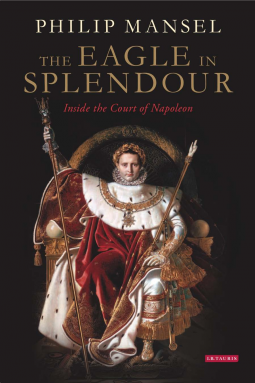
The Eagle in Splendour
Inside the Court of Napoleon
by Philip Mansel
This title was previously available on NetGalley and is now archived.
Send NetGalley books directly to your Kindle or Kindle app
1
To read on a Kindle or Kindle app, please add kindle@netgalley.com as an approved email address to receive files in your Amazon account. Click here for step-by-step instructions.
2
Also find your Kindle email address within your Amazon account, and enter it here.
Pub Date Aug 20 2015 | Archive Date Aug 27 2015
Description
Napoleon’s military conquests changed the world and dominate most portraits of him, but it was through the splendour of his court - more extravagent even than that of the Sun King - that Napoleon governed his empire. His palaces at Saint-Cloud and the Tuileries were the centres of his power, the dazzling reflection of the greatest empire in modern European history.
Using the unpublished papers of the Emperor’s leading courtiers, and his second Empress Marie Louise, Philip Mansel brings to life the intoxicated world and sheds light on the man behind the legend; the mistresses; the hierarchy and class structure he craved; his relationship with his family; his rude behaviour to ambassadors; his insecurities. Mansel illuminates the nature of a personality that conquered half the world yet, in the end, was “devoured by ambition”, abandoned by his courtiers, leaving behind him a country smaller and weaker than he found it.
Advance Praise
DAVID GILMOUR, author of The Pursuit of Italy
“An eloquent and original study of the Bonaparte family, delightfully acute in its depiction of the vanities, rivalries and pretensions of Napoleon.”
DAVID GILMOUR, author of The Pursuit of Italy
Available Editions
| EDITION | Hardcover |
| ISBN | 9781784531751 |
| PRICE | $28.00 (USD) |
Average rating from 20 members
Featured Reviews
 Olga N, Reviewer
Olga N, Reviewer
Thanks to I.B Taurus for providing me with a free copy through Net Galley in exchange for an honest review.
Some historical figures have maintained a hold on people’s imagination for years. Napoleon is one of them. Mansel focuses on Napoleon’s court, its organisation, its style, its people, its excesses and its politics, to tell the story of Napoleon’s rise and fall. Despite Napoleon having started his military career under the auspices of the Revolution, he went on to create a monarchy. Mansel hypothesises (and makes a very good case) that his court was central to his success (and ultimately his failure), and the excesses that characterised such court (the palaces had to be bigger, the furniture more luxurious, the courtiers better dressed, the women prettier…) were an attempt at giving his endeavour a legitimacy that he felt he lacked, in comparison to other monarchs in Europe (and in France), who came from long dynasties of rulers. The book discusses other aspects of Napoleon’s life, including his family, his conquests, his battles, his personal life, but always with a focus on the court. Such focus serves the story well, allowing us to get to know many of the main players, who they had been in previous governments, and what they did under Napoleon’s rule, and is peppered with quotes, that provide a more personal point of view and illuminate the character of Napoleon as seen by his courtiers. The only issue I have with the book is that it is perhaps not best suited for a digital version. There were problems with the formatting of the version I had that I imagine won’t be present in the final version, like strange word divisions, accents out of place, etc. The wonderful images of course are not resizable and although I can adjust the size of the letters so that I can read without glasses, I needed my glasses to see the images well. Also, having all the notes at the back and not being able to follow a clickable link made them difficult to check. Perhaps a chart with the main players and how they connected to each other would also be helpful (especially if it could be linked to the names), more so at the beginning of the book when the reader is not yet familiar with everybody. Although I haven’t read many books on Napoleon I felt that by the end of Mr Mansel’s book I knew the emperor and the man much better. I recommend this book to people who enjoy history and books about Napoleon in particular, and if you can, I’d suggest getting a paper copy as it might obviate some of the difficulties I found with the digital version.
 AliceMaud M, Reviewer
AliceMaud M, Reviewer
Two hundred years after Napoleon was defeated at Waterloo this timely publication of a new edition of Philip Mansel's excellent - and easy to read - study of Napoleon gives us a rare perspective of the man as Emperor rather than as military commander.
In it, we see the vanity, nepotism and arrogance of Napoleon as he set himself up as Emperor of France, appointing his family and closest friends as rulers elsewhere in his "empire" thus distancing himself from those he trusted most. The atmosphere of fear and paranoia in his Court must have been self-perpetuating and I can only assume that, even if he had not been defeated at Waterloo, it would not have taken many years before his Empire would have begun to crack from within.
I started this book as an admirer of what Napoleon had achieved; I have now modified my opinion.
 Celine G, Librarian
Celine G, Librarian
I chose to read this book because I had a rather romantic view of Napoleon mostly from tv series and movies - of him as the great military leader, half of a tragic love story with Josephine and a fair, legacy leaving Emperor. This book has certainly put those inclinations straight!
I'm glad the book focuses on his court and daily routines & relationships rather than the military side (which I think I'd find rather boring despite knowing he is much admired for his military skills).
He seems to very much be overcompensating in many areas for his lack in a few others. Beforehand, I'd have put this down to his insecurity about his height and condescension from other governments but now feel this was mostly due to him not being born of royal blood, therefore having made himself Emperor, felt he had more to prove. He had to be the best and he had to have the best, regardless.
It's a very in depth book, (obviously very well researched), so I found some parts a little hard to keep up with. I appreciated the detailed bios of other important figures in his life, military and personal, but felt as if I could use a who's who's "tree" with bullet points to remind me along the way, as more characters were introduced.
I think this is a great book for anyone interested in Napoleon and his life and times. My father in law loves history and knows a fair bit about Napoleon already but I gave him a copy of this as I was sure he'd love it. He's already deeply submerged and racing through it.
Enjoyed reading about the "man" and his complexities, insecurities and foibles. I'd say no matter how much you think you know about Napoleon, (not a lot like me, or a lot like history buffs), there's still a lot to take away from this book and your impressions will most probably be changed.
 Lisa S, Reviewer
Lisa S, Reviewer
Lord Roseberry once wrote that: 'No Bourbons or Hapsburgs were so imbued with their royal prerogatives as these princes of an hour'. This fascinating book tells the story of Napoleon's grand and aloof court and the strange characters who inhabited it. Napoleon wanted an aristocratic court to rival the other European monarchies and that's what he attempted to create.
It is easy to read and full of interesting anecdotes. I especially enjoyed the tale of how Empress Josephine found her husband in bed with a lady-in-waiting and got so angry that she sent her away. Napoleon had the cheek to lose his temper and smashed up some of the furniture! Poor Josephine was apparently usually lovely and charming but Napoleon's was mostly nasty and rude.
This is a must-read for anyone interested in Napoleon's and the eccentric Bonaparte family.
Readers who liked this book also liked:
Antony Johnston
General Fiction (Adult), Mystery & Thrillers, New Adult
Jennifer Love Hewitt
Biographies & Memoirs, Nonfiction (Adult), Parenting, Families, Relationships















